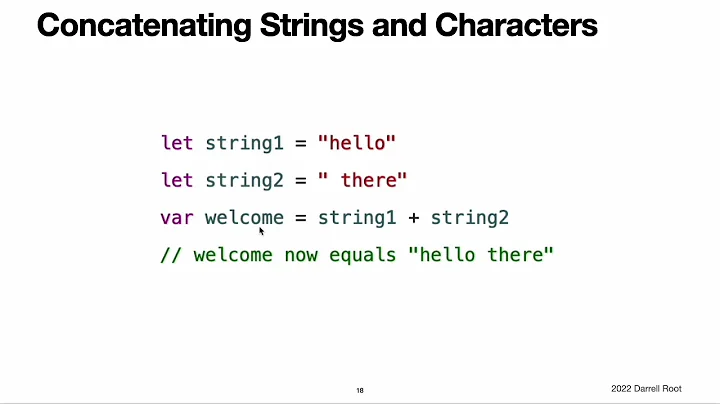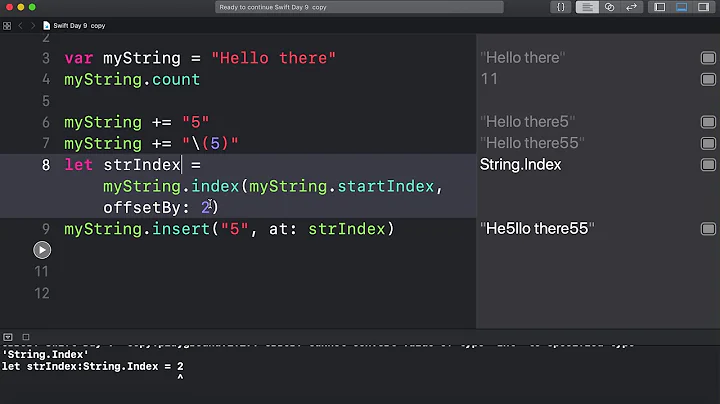How to convert Swift Character to String?
Solution 1
Why don't you use String interpolation to convert the Character to a String?
return "\(firstChar)"
Solution 2
Just the first character? How about:
var str = "This is a test"
var result = str[str.startIndex..<str.startIndex.successor()] // "T": String
Returns a String (as you'd expect with a range subscript of a String) and works as long as there's at least one character.
This is a little shorter, and presumably might be a fraction faster, but to my mind doesn't read quite so clearly:
var result = str[str.startIndex...str.startIndex]
Solution 3
As of Swift 2.3/3.0+ you can do something like this:
func firstLetter() -> String {
guard let firstChar = self.title.characters.first else {
return "" // If title is nil return empty string
}
return String(firstChar)
}
Or if you're OK with optional String:
func firstLetter() -> String? {
guard let firstChar = self.title.characters.first else {
return nil
}
return String(firstChar)
}
Update for Swift 4, also think an extension is better
extension String{
func firstLetter() -> String {
guard let firstChar = self.first else {
return ""
}
return String(firstChar)
}
Solution 4
I did some researches for the same type of question, and I found this way to get any character from any string:
func charAsString(str:String, index:Int) -> String {
return String(Array(str)[index])
}
and for the first character you call
var firstCharAsString = firstLetter("yourString",0)
I am a not very good at programming yet but I think that this will do what you want
EDIT:
Simplified for your need:
func firstChar(str:String) -> String {
return String(Array(str)[0])
}
I hope that it's what you need
Related videos on Youtube
Snowman
Updated on December 07, 2020Comments
-
Snowman over 3 years
I want to return the first letter of a
Stringas aStringinstead of as aCharacter:func firstLetter() -> String { return self.title[0] }However, with the above I get
Character is not convertible to String. What's the right way to convert a Character to a String?This answer suggests creating a subscript extension, but the declaration for
Stringalready has a subscript method:subscript (i: String.Index) -> Character { get }Is that answer outdated, or are these two different things?
-
 Martin R almost 10 yearsHave you tried the answers to the question that you linked to? For example,
Martin R almost 10 yearsHave you tried the answers to the question that you linked to? For example,firstChar = string[string.startIndex]should work. Other answers suggest to overload the subscript operator, which should also work. - This looks really like the same question to me. -
 Martin R almost 10 yearspossible duplicate of Get nth character of a string in Swift programming language
Martin R almost 10 yearspossible duplicate of Get nth character of a string in Swift programming language -
Snowman almost 10 years@MartinR the question is not how to get the nth character but how to convert a Character to a String
-
zaph almost 10 years@mody The question, not the title is: "I want to return the first letter of a String as a String instead of as a Character".
-
Snowman almost 10 years@Zaph by using the built in subscript method which returns a Character and converting it to a String...
-
zaph almost 10 years@mody See the answer by Matt Gibson.
-
 Martin R almost 10 yearsThis answer stackoverflow.com/a/24178591/1187415 to the other question has methods to get a substring (very similar to Matt's answer below).
Martin R almost 10 yearsThis answer stackoverflow.com/a/24178591/1187415 to the other question has methods to get a substring (very similar to Matt's answer below). -
 Saik Caskey over 6 yearsSo let me get this straight, 3 years later and no one can definitively answer the question "How to convert Swift Character to String" i.e., how to convert String.Character to String, without any extra "Optional(...)" padding?!. Ridiculous. Apple users have no idea of the struggle. Swift apologists want to watch the world burn because Apple recommended it should burn.
Saik Caskey over 6 yearsSo let me get this straight, 3 years later and no one can definitively answer the question "How to convert Swift Character to String" i.e., how to convert String.Character to String, without any extra "Optional(...)" padding?!. Ridiculous. Apple users have no idea of the struggle. Swift apologists want to watch the world burn because Apple recommended it should burn.
-
-
Snowman almost 10 yearsDoesn't work:
Character is not convertible to String -
Snowman almost 10 yearsThis doesn't work:
Type 'String.Index' does not conform to protocol 'IntegerLiteralConvertible' -
Snowman almost 10 yearsThe main question is how to convert a Character to a String though.
-
 P1kachu almost 10 yearsYes, that is what
P1kachu almost 10 yearsYes, that is whatString("c")does, doesn't it ? It converts "c" from a Character to a string. Or maybe I don't understand the question... -
 Martin R almost 10 yearsNot very efficient, because it creates a new array containing all characters from the string.
Martin R almost 10 yearsNot very efficient, because it creates a new array containing all characters from the string. -
 hnh almost 10 yearsRight, a string doesn't have a random access index. The 0 in '[0]' cannot be converted to a String 'Index'. Do this "(s[s.startIndex])" or "" + s[s.startIndex]
hnh almost 10 yearsRight, a string doesn't have a random access index. The 0 in '[0]' cannot be converted to a String 'Index'. Do this "(s[s.startIndex])" or "" + s[s.startIndex] -
zaph almost 10 yearsWhy an extension and not just a method?
-
zaph almost 10 yearsInteresting that
Array(str)creates an array ofCharacters, not utf8 unichars. I suspect new to Beta 4. It must scan the entire String withsuccessor()to determine theCharactersand thus reasonably slow. -
 hnh almost 10 years@Zaph Yes. Array(str) invokes "init<S : Sequence where T == T>(_ s: S)" - there is no String specific array initializer. It just takes any Sequence and adds the elements by iterating over it. String is just a special Sequence<Character> in this context.
hnh almost 10 years@Zaph Yes. Array(str) invokes "init<S : Sequence where T == T>(_ s: S)" - there is no String specific array initializer. It just takes any Sequence and adds the elements by iterating over it. String is just a special Sequence<Character> in this context. -
zaph almost 10 yearsI down voted because IMO doing something on a local level is better than moving to a global level. Adding a method to a base class tends to be confusing. In general one issue we have had with Objective-C was the use of Categories for no good reason. BTW, the Swift documents use the term
methodeven though the syntax isfund, somewhat of a disconnect. -
 hnh almost 10 years@Zaph. This is incorrect. Extensions don't spawn module boundaries like categories do - only if you mark them public (and the other side actually imports your module). As a matter of fact that is one reason why I prefer an extension, it keeps the (String specific) function local to the structure instead of polluting the global namespace. Please reconsider ;->
hnh almost 10 years@Zaph. This is incorrect. Extensions don't spawn module boundaries like categories do - only if you mark them public (and the other side actually imports your module). As a matter of fact that is one reason why I prefer an extension, it keeps the (String specific) function local to the structure instead of polluting the global namespace. Please reconsider ;-> -
zaph almost 10 yearsWhen I see
str.firstCharacterAsStringI have to wonder is that aStringbuiltin for a 3rd party method. A method invocation is more clear where and by whom it is implemented. If I pick up a bit of code from another project that contains this it is nit clear I need to also get theExtension. As I stated: IMO. -
 hnh almost 10 yearsLet us continue this discussion in chat.
hnh almost 10 yearsLet us continue this discussion in chat. -
zaph almost 10 yearsThe Swift Programming Language documents has 507 references to
method, it seems clear that it is not clear if 'method' or 'function' is the preferred nomenclature. -
 nCod3d over 7 yearsPlease explain, why is this wrong? As I wrote in description to this method : "Or if you're OK with optional String". Its just a version with Optional return type. Maybe someone would want to do optional chaining like 'if let', 'guard let' outside the method or something. There is nothing wrong about Optional type, its just an option.
nCod3d over 7 yearsPlease explain, why is this wrong? As I wrote in description to this method : "Or if you're OK with optional String". Its just a version with Optional return type. Maybe someone would want to do optional chaining like 'if let', 'guard let' outside the method or something. There is nothing wrong about Optional type, its just an option. -
 Eric Aya over 7 yearsI have explained in my comment. But maybe I wasn't clear. :) Look at this screenshot: evernote.com/l/AOzlMTJ9ky9CY65GgrWrGAc2z_UPA9eS5_o What you return is the literal String "Optional("y")" inside an Optional.
Eric Aya over 7 yearsI have explained in my comment. But maybe I wasn't clear. :) Look at this screenshot: evernote.com/l/AOzlMTJ9ky9CY65GgrWrGAc2z_UPA9eS5_o What you return is the literal String "Optional("y")" inside an Optional. -
 Eric Aya over 7 yearsAnd yeah, reading it again I see that my first comment wasn't super clear, sorry for that. Hopefully with the screenshot you will understand your mistake and see my point.
Eric Aya over 7 yearsAnd yeah, reading it again I see that my first comment wasn't super clear, sorry for that. Hopefully with the screenshot you will understand your mistake and see my point. -
 nCod3d over 7 yearsAhhhh... You were right :) My bad. [link] (evernote.com/shard/s312/sh/c6f45143-7d00-44c9-844c-7580754f84cd/…) good thing that they've added an argument name for String init method in Swift 3.0 ;) Gonna update my code..
nCod3d over 7 yearsAhhhh... You were right :) My bad. [link] (evernote.com/shard/s312/sh/c6f45143-7d00-44c9-844c-7580754f84cd/…) good thing that they've added an argument name for String init method in Swift 3.0 ;) Gonna update my code.. -
 Eric Aya over 7 yearsYeah, having Optional conforming to StringLiteralConvertible is one of the rare bad decisions the Swift team has made IMO. This causes many issues where people think they have an Optional where they actually have the literal string "Optional(something)" instead. Your example was tricky because you then wrapped this literal inside a real Optional. ;)
Eric Aya over 7 yearsYeah, having Optional conforming to StringLiteralConvertible is one of the rare bad decisions the Swift team has made IMO. This causes many issues where people think they have an Optional where they actually have the literal string "Optional(something)" instead. Your example was tricky because you then wrapped this literal inside a real Optional. ;) -
 nCod3d over 7 yearsI've created a spy/bug :))
nCod3d over 7 yearsI've created a spy/bug :)) -
 nCod3d over 7 yearsFor people who down-votes: there was a bug, now its all good and working as intended...I sorta corrected it...In case you'll wonder..whatever...
nCod3d over 7 yearsFor people who down-votes: there was a bug, now its all good and working as intended...I sorta corrected it...In case you'll wonder..whatever...










